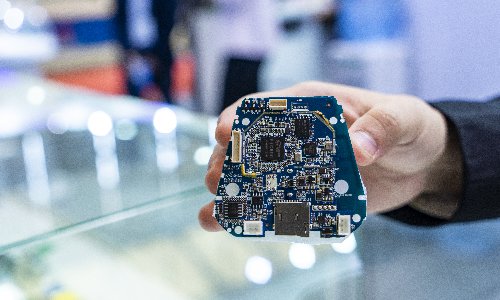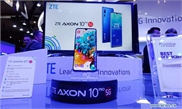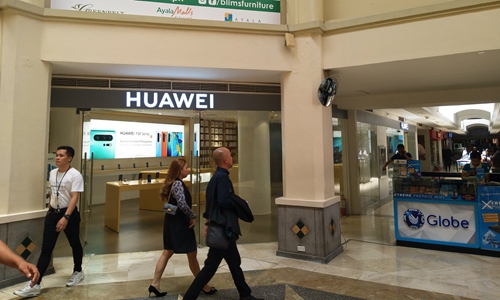SOURCE / INDUSTRIES
Chip sector expands in first half despite COVID-19 pandemic

An employee showcases a semiconductor integrated circuit at an industry expo on October 31. Photo: VCG
Sales of integrated circuits in Shanghai, one of the Chinese cities with the most complete and mature semiconductor industry chains, grew 38.7 percent year-on-year from January to May, a welcome jump amid the headwinds of the coronavirus, official data showed.
Meanwhile, the added value of the integrated circuit sector rose more than 30 percent in East China's Anhui Province, according to data from local authorities. The first 12-inch wafer manufacturing company in the province - Hefei Nexchip Co - raised its monthly capacity to 22,000 in the first quarter, from 20,000 at the same time last year.
Industry observers said that the increase in Shanghai, a long-time leader in the country's chip sector and Anhui, an emerging chip-manufacturing hub, showed the rapid growth of the country's semiconductor sector in the first half.
The trend was also in line with last year, when China's chip sales rose 15 percent year-on-year even as sales in the global market fell by 12 percent.
The pandemic didn't have a big impact on the semiconductor industry, which expanded in the first half, said Zhou Zixue, chairman of the China Semiconductor Industry Association, at the SEMICON CHINA 2020 on Saturday.
The sector also provides important support for fighting the pandemic, because chips are widely used in temperature measurement devices and other medical supplies, Zhou said.
Growth in the sector was partly due to the increased demand for chips during the pandemic, as well as the previous two years' intensive efforts to build up a self-reliant semiconductor sector under US' crackdown, Liu Kun, a veteran industry observer, told the Global Times on Sunday.
After two years spent building their factories, more emerging players either began to make profits or achieved mass production in the first half, Liu said.
Silan, a chipmaker in Hangzhou, East China's Zhejiang Province, told the Global Times on Sunday that it has been performing well so far despite the COVID-19 impact, and it has been expanding production and hiring talent.
US' intensified chip export limits on Chinese technology giants like Huawei, which have high standards for suppliers and partners, give domestic companies that previously didn't qualify as suppliers a chance to become major players in the 5G era, the manager of a domestic semiconductor firm told the Global Times on Saturday.
"Once you are 'picked' by leading firms like Huawei or Xiaomi, it means you will be 'forced' to follow high standards. You will also have more chance to make a profit," the manager said, asking to remain anonymous.
While the US technology ban will no doubt pose difficulties for domestic companies in the short run, in the longer term, the pressure will force China to innovate and catch up quickly, Geng Bo, a vice secretary-general of the China Solid State Lighting Alliance, a semiconductor industry association, told the Global Times on Sunday.
Nevertheless, Liu noted that despite rapid growth in the sector, China will depend heavily on imported products for a certain time, especially high-end ones from the US.
In May 2020, China imported 40.61 billion integrated circuits, up 14.3 percent year-on-year, industry data showed.



